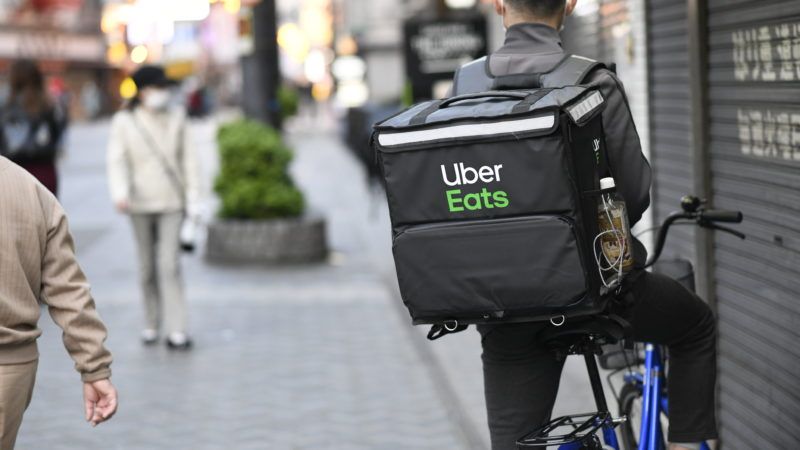Restaurants Are Facing a COVID-19 Crisis. Price Controls on Food Delivery Services Won't Help.
Cities are imposing "emergency" regulations capping the fees that delivery services like Uber Eats may charge. That's a mistake.

The coronavirus crisis has given politicians carte blanche to regulate businesses, without the usual legislative checks and balances and court challenges. If there were any doubt before, we now know without question that politicians—especially in the nation's largest cities—have absolutely no clue how entrepreneurship, incentives and the economy function. The longer the shutdowns persist, the more obvious this will become to most of us.
Few services have become more important these days than home deliveries. People are supposed to stay at home, but they still need household goods and especially food. Fortunately, a number of tech companies such as DoorDash, Uber Eats and Postmates have developed highly sophisticated and efficient systems for getting restaurant meals served to your door—and at an affordable price.
It's pretty amazing, really. We recently ordered a meal and it was delivered quickly to our home in a rural area. It's Adam Smith's invisible hand at work. Companies use various pricing systems, but it all works voluntarily and seamlessly (from a customer's perspective). If that meal is too expensive, you don't have to buy it—or you can choose a competitor that offers something similar at a better price. It's how the marketplace always works.
Unfortunately, politicians are intent on messing with these arrangements by placing price caps on the commissions that delivery companies charge to restaurants. Such rules aren't being imposed to protect customers and they certainly won't help encourage social distancing at a time when people are commanded to shelter in place.
Instead, these "emergency rules" are imposed partly at the behest of the restaurant lobby, which has long complained about the commissions that delivery services charge them, which typically range from 10 percent to 30 percent depending on various factors.
The restaurants are using the pandemic to get special favors and the politicians seem to enjoy passing edicts that are designed to protect favored industries. Politicians are concerned about the plight of restaurants now, given that stay-at-home orders have forced them to halt dine-in service. They must rely on take-out orders and curbside pickups. We're all sympathetic to their situation.
But these so-called "commission caps" are nothing more than price controls. Such controls—regardless of industry—have a long history of creating shortages. If delivery services can't charge what the market will bear, many of them will simply stop delivering food, or charge customers higher fees, or stop delivering food from lower-cost restaurants where there's not enough of a tab for them to profit. It will dampen competition, which is the best way to keep prices low.
When it comes to bad ideas, San Francisco often leads the way. In April, Mayor London Breed, at the urging of the Board of Supervisors, capped home-delivery commissions at 15 percent to help restaurants for the duration of the crisis. There's an ongoing attempt there to expand the cap beyond the coronavirus shutdowns—and several other cities, including Chicago and New York, are following suit.
For instance, the Washington, D.C. City Council last week voted unanimously in favor of a broad emergency package that would, among many other things, forbid "a third-party food delivery platform to charge a restaurant a commission fee" above 15 percent of the price of the order. The delivery platform may not reduce compensation rates to its drivers as a result of the law. It remains to be seen how the delivery companies will deal with the new rules.
The delivery services have every reason to want restaurants, which are the heart and soul of their business, to remain economically viable. Some of them have voluntarily slashed fees to independent restaurants, waived fees for new restaurants and provided millions of dollars in donations to aid restaurants. But they still need to turn a profit, and to adopt the pricing arrangements that work best for them and their drivers.
If restaurants don't want to do business with them, they have that option—or they can hire their own delivery drivers. If restauranteurs don't understand the problem with price caps, then they ought to think about what happen if local officials decided to impose caps on the prices that they charge. Hey, meal prices are too high for many out-of-work Americans, after all. Of course, the results would be that many of them would go out of business.
"These proposals…would place food delivery services in an impossible position," according to a recent letter from a coalition of market-oriented and taxpayer-protection groups. "Capped fees may be less than the cost of services to delivery companies, essentially forcing these innovators to operate a government-mandated loss." If the companies pass on higher fees to consumers, many customers "would respond by picking up food at restaurants directly, increasing the risk of transmitting the coronavirus to vulnerable populations."
As the old libertarian saying goes, "There Ain't No Such Thing As A Free Lunch (TANSTAAFL)." And there's no such thing as a free delivery of a lunch, either, no matter how much government officials wish it were so. The best thing is for city officials to let the marketplace figure out the right pricing on its own. By impeding that natural process, governments will only make it harder for their residents to stay home and get meals delivered to their door.


Show Comments (15)